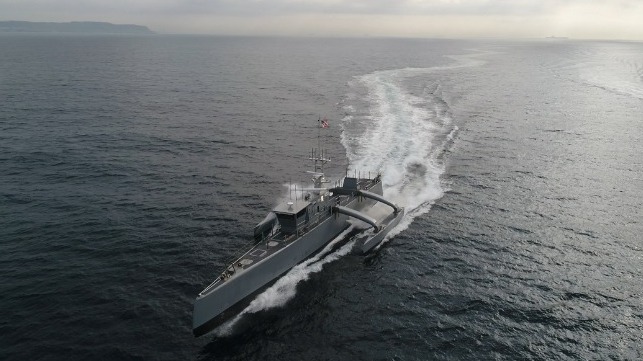Pentagon's Naval Shipbuilding Plan Endorses Unmanned Vessels

With a new Pentagon-authored shipbuilding plan, U.S. Secretary of Defense Mark Esper is going all-in on unmanned vessel technology to increase the size and capability of the U.S. Navy's fleet.
In February, Secretary Esper delayed the release of the Navy's own future fleet plan and initiated a Pentagon-led review, titled the Future Naval Force Study. Under the direction of Deputy Secretary of Defense David Norquist, the Navy, the Marine Corps, the Pentagon's Cost Assessment and Program Evaluation Office and a group of outside advisers looked at future threats and technology to formulate a new "future fleet" architecture. Esper described the new plan as a "game-changer."
"In short, it will be a balanced force of over 355 ships - both manned and unmanned - and will be built in a timely, relevant, and budget-informed manner. And we will build this fleet in such a way that balances tomorrow’s challenges with today’s readiness, and does not create a hollow Navy," Esper said.
The plan calls for boosting the Navy's shipbuilding budget to 13 percent of its total, up from 11 percent, and it places particular emphasis on funding and building unmanned systems - an area where Congress has been reticent to move forward at full speed.

that matters most
Get the latest maritime news delivered to your inbox daily.
"Today, we are at [an] inflection point – one where unmanned technologies and long-range precision weapons will play an increasingly leading role. The U.S. military, including the Navy, must adapt to that future as the character of warfare changes," Esper said. "[The future] fleet will be need to be marked by more and smaller surface combatants; optionally manned, unmanned, and autonomous surface and subsurface vehicles; unmanned carrier-based aircraft of all types; a larger and more capable submarine force; and a modern strategic deterrent."
The secretary called for Congress to rally behind the transformation of the Navy by giving it adequate funding, allowing it to sunset expensive legacy systems and letting it roll over unused funding into the shipbuilding account. He also called for timely budgets: delayed budget bills (accompanied by restrictive continuing resolutions) are a major challenge for all branches of the military, as they force program delays, create disruption in the procurement process and make it hard for defense contractors to plan ahead.
